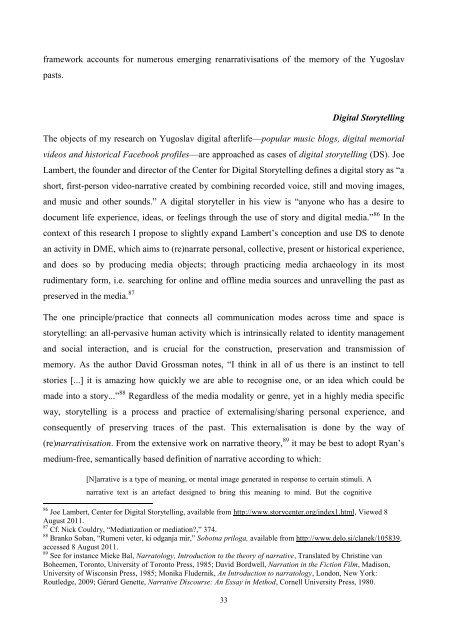UNIVERSITY OF NOVA GORICA GRADUATE SCHOOL ...
UNIVERSITY OF NOVA GORICA GRADUATE SCHOOL ...
UNIVERSITY OF NOVA GORICA GRADUATE SCHOOL ...
Create successful ePaper yourself
Turn your PDF publications into a flip-book with our unique Google optimized e-Paper software.
framework accounts for numerous emerging renarrativisations of the memory of the Yugoslav<br />
pasts.<br />
33<br />
Digital Storytelling<br />
The objects of my research on Yugoslav digital afterlife—popular music blogs, digital memorial<br />
videos and historical Facebook profiles—are approached as cases of digital storytelling (DS). Joe<br />
Lambert, the founder and director of the Center for Digital Storytelling defines a digital story as ―a<br />
short, first-person video-narrative created by combining recorded voice, still and moving images,<br />
and music and other sounds.‖ A digital storyteller in his view is ―anyone who has a desire to<br />
document life experience, ideas, or feelings through the use of story and digital media.‖ 86 In the<br />
context of this research I propose to slightly expand Lambert‘s conception and use DS to denote<br />
an activity in DME, which aims to (re)narrate personal, collective, present or historical experience,<br />
and does so by producing media objects; through practicing media archaeology in its most<br />
rudimentary form, i.e. searching for online and offline media sources and unravelling the past as<br />
preserved in the media. 87<br />
The one principle/practice that connects all communication modes across time and space is<br />
storytelling: an all-pervasive human activity which is intrinsically related to identity management<br />
and social interaction, and is crucial for the construction, preservation and transmission of<br />
memory. As the author David Grossman notes, ―I think in all of us there is an instinct to tell<br />
stories [...] it is amazing how quickly we are able to recognise one, or an idea which could be<br />
made into a story...‖ 88 Regardless of the media modality or genre, yet in a highly media specific<br />
way, storytelling is a process and practice of externalising/sharing personal experience, and<br />
consequently of preserving traces of the past. This externalisation is done by the way of<br />
(re)narrativisation. From the extensive work on narrative theory, 89 it may be best to adopt Ryan‘s<br />
medium-free, semantically based definition of narrative according to which:<br />
[N]arrative is a type of meaning, or mental image generated in response to certain stimuli. A<br />
narrative text is an artefact designed to bring this meaning to mind. But the cognitive<br />
86 Joe Lambert, Center for Digital Storytelling, available from http://www.storycenter.org/index1.html, Viewed 8<br />
August 2011.<br />
87 Cf. Nick Couldry, ―Mediatization or mediation?,‖ 374.<br />
88 Branko Soban, ―Rumeni veter, ki odganja mir,‖ Sobotna priloga, available from http://www.delo.si/clanek/105839,<br />
accessed 8 August 2011.<br />
89 See for instance Mieke Bal, Narratology, Introduction to the theory of narrative, Translated by Christine van<br />
Boheemen, Toronto, University of Toronto Press, 1985; David Bordwell, Narration in the Fiction Film, Madison,<br />
University of Wisconsin Press, 1985; Monika Fludernik, An Introduction to narratology, London, New York:<br />
Routledge, 2009; Gérard Genette, Narrative Discourse: An Essay in Method, Cornell University Press, 1980.

















